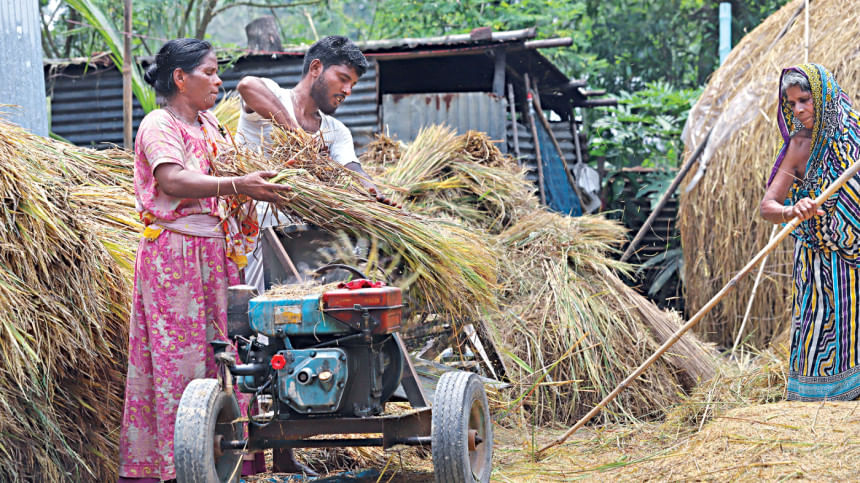Small machinery tailored for farmers can boost output: experts

Small agricultural machines tailored for Bangladesh's smallholder farmers could drive a new wave of cost-efficient productivity and rural prosperity, experts said at a seminar yesterday.
Highlighting the urgency for labour-saving agri-tech solutions, the speakers stressed that affordable, easy-to-use equipment can slash production costs, boost yields, and make farming more sustainable.
The seminar, titled "Appropriate Mechanization in Bangladesh for Sustainable Smallholders' Arable Crops Farming: From Local Adaptation to Scaling Up," was held at InterContinental Dhaka.
It was organised by the Hub for Smallholders Agri-Tech Economics (HSATE) of Bangladesh Agricultural University (BAU), in collaboration with the International Growth Centre of the University of Oxford.
Associate Professor AKM Abdullah Al-Amin of the BAU and Professor James Lowenberg-DeBoer, Elizabeth Creak Chair of Agri-tech Applied Economics at Harper Adams University, UK, jointly presented research.
The speakers called for greater investment, farmer training, and partnerships with local manufacturers to speed up technology adoption
It showed that small autonomous machines—when adapted to local conditions—can deliver strong economic returns within just a few cropping seasons.
The speakers called for greater investment, farmer training, and partnerships with local manufacturers to speed up technology adoption, warning that rural labour shortages make modernisation no longer a luxury but a necessity.
Al-Amin presented a transformative vision for Bangladesh's smallholder farms, emphasising the economic advantages of labour-saving agricultural technologies tailored to local farming conditions.
He explained that retrofitted small-scale autonomous machines can significantly reduce farming costs by lowering dependence on manual labour while increasing operational efficiency, thus enhancing farmers' profit margins.
Initial investments in small machinery could break even within a few seasons if financing is accessible, he said.
Mechanisation can also allow farmers to intensify production cycles—planting and harvesting more promptly—which would lead to higher annual yields, lift household incomes, reduce rural poverty, and strengthen national food security, Al-Amin added.
On local adaptation, he said the potential for small machines was particularly strong.
Adoption rates could be high if technologies are affordable, easy to use, and simple to maintain, he said.
Partnering with local manufacturers and service providers could foster community-level economic resilience by making farmers active participants in the mechanisation value chain, added Al-Amin.
He also emphasised the need for education and demonstration programmes to build trust in new technologies. Pilot projects, farmer field schools, and digital advisory services could bridge knowledge gaps and catalyse widespread adoption, he said.
While acknowledging challenges like financing barriers and infrastructure limitations, Al-Amin remained optimistic.
He stressed that labour-saving technologies must be inclusive, offering new opportunities for rural women and youth to make agriculture more attractive to the next generation.
Mohammad Emdad Ullah Mian, secretary to the Ministry of Agriculture, stressed the urgent need for accurate agricultural data, strategic planning, and mechanisation to strengthen Bangladesh's farming sector.
He admitted that the sector still lacked a comprehensive strategic framework, making data-driven policymaking difficult.
He emphasised collaboration with the Bangladesh Bureau of Statistics (BBS) and other agencies to synchronise government data for better planning regarding production, imports, and exports.
Mian also called for modernisation through technologies such as drones and robotics and urged greater private sector and institutional collaboration.
He invited experts and retired professionals to contribute ideas voluntarily, promising that all contributions would be formally acknowledged.
"Innovative thinking and collaborative efforts are critical to drive transformation," Mian said, adding that accurate crop projections were essential to prevent crises like last year's onion surplus.
In another "Supply Stakeholders' Workshop," ASM Golam Hafeez, member of the Bangladesh Public Service Commission, said rural labour shortages driven by urban migration and demographic shifts were putting farms under strain.
Labour-saving agri-tech offers a timely solution, he said.
However, Hafeez pointed out that not all equipment is suitable for all land types across the country. Mechanisation is needed at every stage—from planting to harvesting—to ensure profitable agriculture, he stressed.
He also noted that about one lakh hectares of cultivable land were being lost annually to housing construction, underlining the urgency for efficient land use.
Valentine Achancho, country director of the International Fund for Agricultural Development, said the organisation was ready to cooperate to promote sustainable rural mechanisation.
He emphasised involving educated youth in the agriculture sector to introduce modern practices and boost productivity.
Achancho highlighted that small machines were more appropriate for Bangladesh's fragmented landholdings and called for comprehensive training to ensure farmers use the equipment efficiently.
AK Fazlul Haque Bhuiyan, vice-chancellor of the BAU, also emphasised quality research and innovation to develop suitable small equipment for agro-mechanisation.
"We need win-win agricultural production for both cultivators and consumers through cost efficiency," he said, adding that end users must decide the type of machinery best suited for their needs.
As Bangladesh grapples with changing rural dynamics, experts at the event said labour-saving agri-tech offers a hopeful path toward sustainable growth, rural prosperity, and enhanced food security for millions.

 For all latest news, follow The Daily Star's Google News channel.
For all latest news, follow The Daily Star's Google News channel. 



Comments